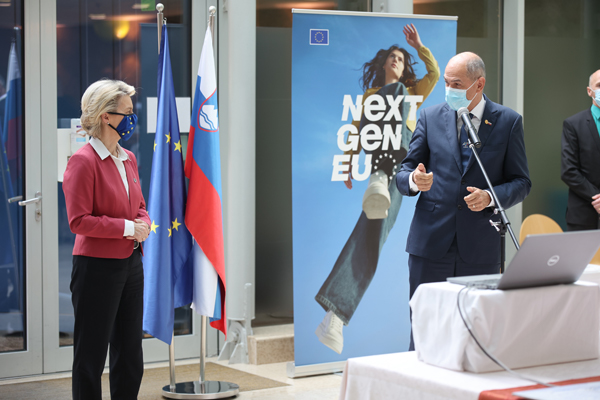A Spanish versión was published on 7/7/2021 in EuroEFE Euractiv, and an Italian version in Euractive Italy.
An earlier English version of this text was published as part of the recommendations to the Slovenian Presidency by TEPSA (Trans European Policy Studies Association).
“The implementation of Next Generation EU is without doubt the most important item on the agenda.”
On 1 July 2021 Slovenia took over the Presidency of the Council of the EU from Portugal. COVID-19 is one of the most severe crises the Union has ever faced and European societies, democracies and economies are only just beginning to heal. After three ‘Corona’ presidencies –Croatia, Germany and Portugal– the Slovenian Presidency’s prior focus should be to start leading the Union towards its future. The implementation of Next Generation EU is without doubt the most important item on the agenda. Now that all member states have ratified the Own Resources Decision, the time has come to start financing and implementing the national Recovery and Resilience Plans. Secondly, the Conference on the Future of Europe has already kicked off. Citizens’ panels and plenaries will take place during the Slovenian Presidency. Thirdly, the broader debate on strategic autonomy will also be on the table waiting for a real attribution to the term and giving substance to it through the ongoing process for the adoption of the Strategic Compass and new initiatives in the fields of digital, trade, finance and others. The Union has recently pushed to achieve a common stance, be it against Turkey, Russia or Belarus. How to deal with these external challenges should be at the core of the discussion.
Time to recover
‘Time is of the essence’ has recently been the mantra of Brussels’ institutions in relation to Next Generation EU. The Slovenian Presidency has the task of keeping the clock ticking. The Commission was technically ready to go to the financial markets in June 2021. Additionally, time is moving on regarding the national Recovery and Resilience Plans. Both the Commission and the Council are tasked to keep the timeframe in order to avoid further disruption in economic welfare and social well-being after the COVID-19 pandemic. At the same time, investment plans need to be thoroughly checked with a view to reinforcing Europe’s resilience, providing for an actual green and digital transition and protecting citizens and European values –because substance, just like time, is of the essence–. The rule of law, as one of the EU’s core principles, should also be at the centre. The Slovenian Presidency needs to aim for a comprehensive and future oriented recovery that includes reforms in health policy, tackling the question of the European Health Union just like the legislative package on climate and energy policy in order to comply with the ambitious aims of the European Green Deal.
Time to talk about the future
One of the tasks of the Slovenian Presidency is also to keep up with the implementation of the Conference on the Future of Europe. Even if the Inaugural Plenary and the first European citizens’ event took place in June, right before the end of the Portuguese Presidency, two other encounters (in October and December) will be held under the Slovenian one. As already known, there are many issues on the agenda including the future of democracy, climate change, health policy and social justice, which require innovative thinking. The Slovenian Presidency should lead the way during all these discussions, while cooperating intensely with the French Presidency to draw conclusions for the Conference. According to a Special Eurobarometer survey on the Future of Europe that was published in March 2021, a very large majority of Europeans –92%– agree that the EU’s public opinion should be taken more into account for decisions related to the future of Europe while three-quarters of Europeans consider that ‘the Conference would represent significant progress for democracy within the EU’. Taking this into consideration, the Slovenian Presidency should guarantee the correct functioning of the Conference and not deceive citizens’ expectations.
Time to set the strategic horizon
The conceptual discussion about the EU’s strategic autonomy has outlived its function and it is time to deliver in order to ensure the credibility of the Union at the global level. This process has been accelerated by the activism of the Biden Administration and the clear signals coming from the other side of the Atlantic for a renewed partnership, anchored in NATO and founded on a stronger cooperation against strategic competitors such as China and Russia.
Operationalising strategic autonomy is easier said than done, as it entails both equipping the EU with adequate capabilities to respond to identified threats and defining its strategic priorities for regional and global matters. Additionally, a broader definition of external action should frame the EU’s scope for manoeuvre. What cannot be achieved in conventional or unconventional encounters of hard power, could be managed through trade agreements or conditionality over environmental standards.
The next six months following the June EU-US Summit will be particularly dense in this respect, demanding crucial decisions that will show the extent of the EU’s determination to give substance to its talks on autonomy.
“(…) the Slovenian Presidency [requires] to spend some time on clearing the way for the Western Balkans.”
On capability-development, the process leading to the adoption of a Strategic Compass seems to have entered a more promising phase, as new proposals have been tabled to enhance the EU’s readiness to intervene and react. These include creating a 5,000-strong First Entry Force, expanding the use of the provision of Art. 44.7 TEU to entrust a core group of Member States to conduct missions on behalf of the EU, strengthening command and control structures in Brussels, as well as expanding the EU’s toolbox to counter cyber and hybrid threats.
Regionally, it is time for the EU to narrow down its shopping list and concentrate on key priority actions, starting with the preparation of the Libyan general elections in December, addressing the deteriorating security and democratic situation in the Eastern neighbourhood, in particular in Belarus and Ukraine, and speeding up the enlargement process for the Western Balkans, including the start of accession negotiations with Albania and North Macedonia. This requires the Slovenian Presidency to spend some time on clearing the way for the Western Balkans. Its plans for hosting a EU-Western Balkans Summit is therefore a very welcome initiative.
At the global level, it is urgent for the EU to take a coherent stance on post-pandemic global matters such as international trade and investments, starting with the EU’s deal with the bloc of Latin American Mercosur countries and the EU-China Comprehensive Agreement on Investments, as well as on a waiver for COVID-19 vaccine patents. In a world that is struggling to deal with the consequences of the pandemic, the resurgence of regional conflicts and the vagaries of power politics, a more strategic European action could be a game changer.




